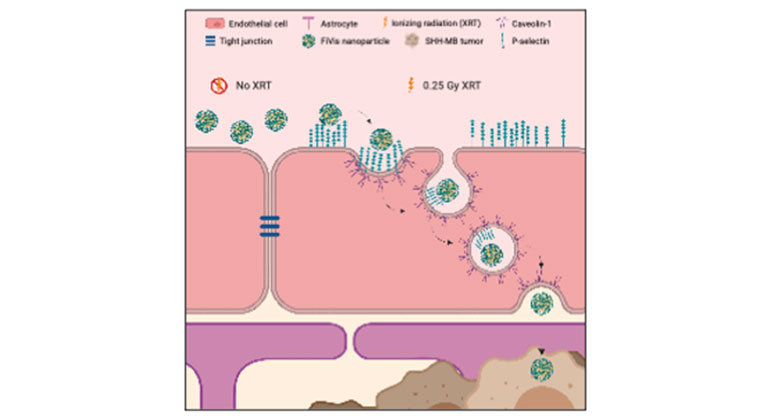Mount Sinai Researchers Identify Respiratory Support as Source of Exposure to Phthalates in Neonatal Intensive Care Units
Study published in Journal of Exposure Science and Environmental Epidemiology
In a study published online in the Journal of Exposure Science and Environmental Epidemiology, Mount Sinai researchers identify noninvasive respiratory support as a source of phthalate exposure in the neonatal intensive care unit (NICU).
The study builds on earlier work by the same researchers that showed differences in behavior of hospitalized premature infants who had been exposed to higher levels of specific mixtures of phthalates. Phthalates are chemicals that make plastic medical equipment more flexible and durable.
The research team used these earlier findings to look for the source of these specific mixtures of phthalates, and found that non-invasive respiratory support equipment—nasal prongs delivering oxygen and air pressure—are a previously unrecognized source of significant phthalate exposure in the NICU.
“The finding that noninvasive respiratory support circuits may convey exposure to potentially neuroactive phthalates provides a possible avenue to improve neurobehavioral outcomes among NICU graduates,” says Annemarie Stroustrup, MD, MPH, Chief of Newborn Medicine, Mount Sinai Kravis Children’s Hospital and the Mount Sinai Health System, and Associate Professor of Pediatrics; Environmental Medicine and Public Health; and Obstetrics, Gynecology, and Reproductive Science at the Icahn School of Medicine at Mount Sinai.
“Our study suggests exposure to common and clinically impactful phthalates still exists, despite efforts by hospital NICUs and medical equipment manufacturers to limit exposure by changing the materials used in feeding supplies. The big takeaway is that there is still more that can be done to protect developmentally vulnerable newborns in the hospital environment,” says Dr. Stroustrup.
In the United States, more than 300,000 infants are admitted to NICUs every year. The majority of these patients, an estimated 200,000 inpatients, require noninvasive respiratory support during their hospitalization, sometimes for weeks or even months.
Phthalates are a family of industrial chemicals that are bonded to plastic materials to enhance flexibility and durability. Because they are not chemically integral to the plastic scaffold, phthalates leach from the solid plastic matrix, particularly in hot and humid conditions such as are found in the neonatal incubator. With a chemical structure that is similar to naturally occurring steroid hormones, phthalates belong to a class of synthetic chemicals referred to as “endocrine disruptors.” As noted above, in a previous study published in PLOS ONE, also led by Dr. Stroustrup, researchers documented an association between NICU-based phthalate exposure and neurobehavioral performance in infancy. The current study is an extension of this inquiry.
In this study, premature newborns with birth weight less than 1,500 grams were recruited via their parents to participate in a prospective environmental health cohort during their NICU hospitalization. Exposure to specific NICU equipment was recorded daily during the NICU hospitalization.Researchers analyzed 149 urine specimens from 71 infants for the presence of phthalate metabolites.
In initial analyses, exposure to medical equipment was directly related to phthalate levels, with biomarkers for the most commonly studied phthalate, di(2- ethylhexyl)phthalate, abbreviated as DEHP, 95 percent to 132 percent higher for infants exposed to specific medical equipment types compared to those without that equipment exposure.
This association was mirrored for clinically relevant phthalate mixtures, whether composed of DEHP metabolites or not. In models accounting for concurrent equipment use, exposure to respiratory support was associated with DEHP biomarkers that were 50 percent to 136 percent higher in exposed infants compared to unexposed infants.
“If validated in larger studies, this research could pave the way for improvements in medical equipment manufacturing to focus on reductions in hospital-based exposure to clinically important phthalates for vulnerable populations,” says Dr. Stoustrup.
The study was funded by the National Institutes of Environmental Health Sciences and the National Institutes of Health for the Environmental Influences on Child Health Outcomes program.
About the Mount Sinai Health System
Mount Sinai Health System is one of the largest academic medical systems in the New York metro area, with 48,000 employees working across eight hospitals, more than 400 outpatient practices, more than 600 research and clinical labs, a school of nursing, and a leading school of medicine and graduate education. Mount Sinai advances health for all people, everywhere, by taking on the most complex health care challenges of our time—discovering and applying new scientific learning and knowledge; developing safer, more effective treatments; educating the next generation of medical leaders and innovators; and supporting local communities by delivering high-quality care to all who need it.
Through the integration of its hospitals, labs, and schools, Mount Sinai offers comprehensive health care solutions from birth through geriatrics, leveraging innovative approaches such as artificial intelligence and informatics while keeping patients’ medical and emotional needs at the center of all treatment. The Health System includes approximately 9,000 primary and specialty care physicians and 11 free-standing joint-venture centers throughout the five boroughs of New York City, Westchester, Long Island, and Florida. Hospitals within the System are consistently ranked by Newsweek’s® “The World’s Best Smart Hospitals, Best in State Hospitals, World Best Hospitals and Best Specialty Hospitals” and by U.S. News & World Report's® “Best Hospitals” and “Best Children’s Hospitals.” The Mount Sinai Hospital is on the U.S. News & World Report® “Best Hospitals” Honor Roll for 2024-2025.
For more information, visit https://www.mountsinai.org or find Mount Sinai on Facebook, Twitter and YouTube.

Scientists Develop Novel Approach to Enhance Drug Delivery for Brain Tumors in Children
Mar 02, 2023 View All Press ReleasesMount Sinai Researchers Conduct Study of Second-Hand Marijuana Smoke in Children
Nov 19, 2018 View All Press Releases